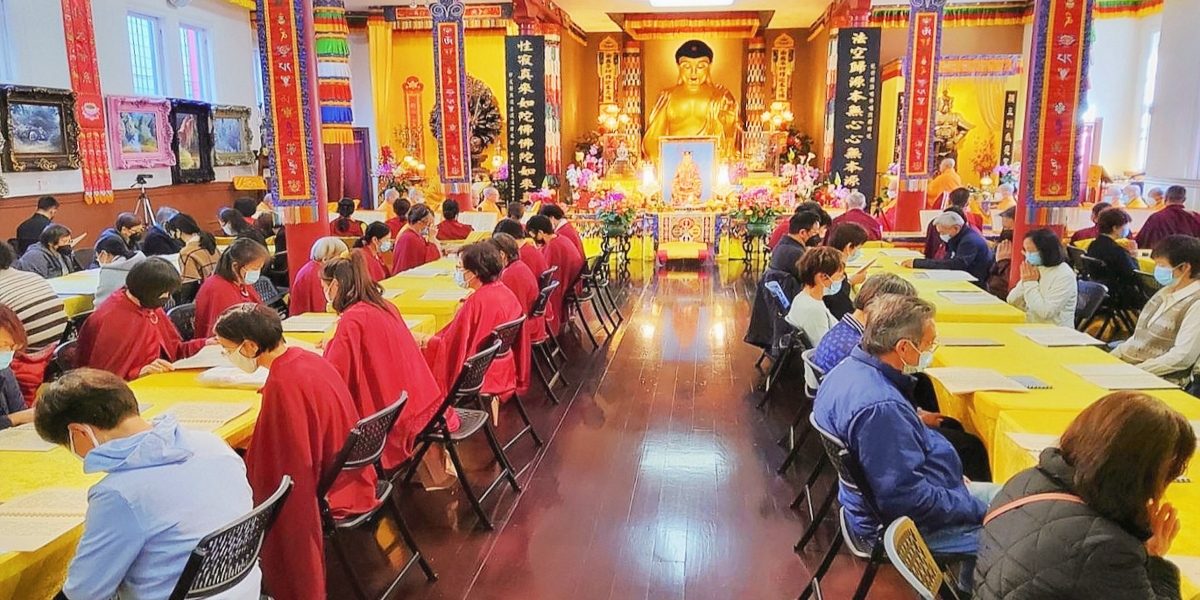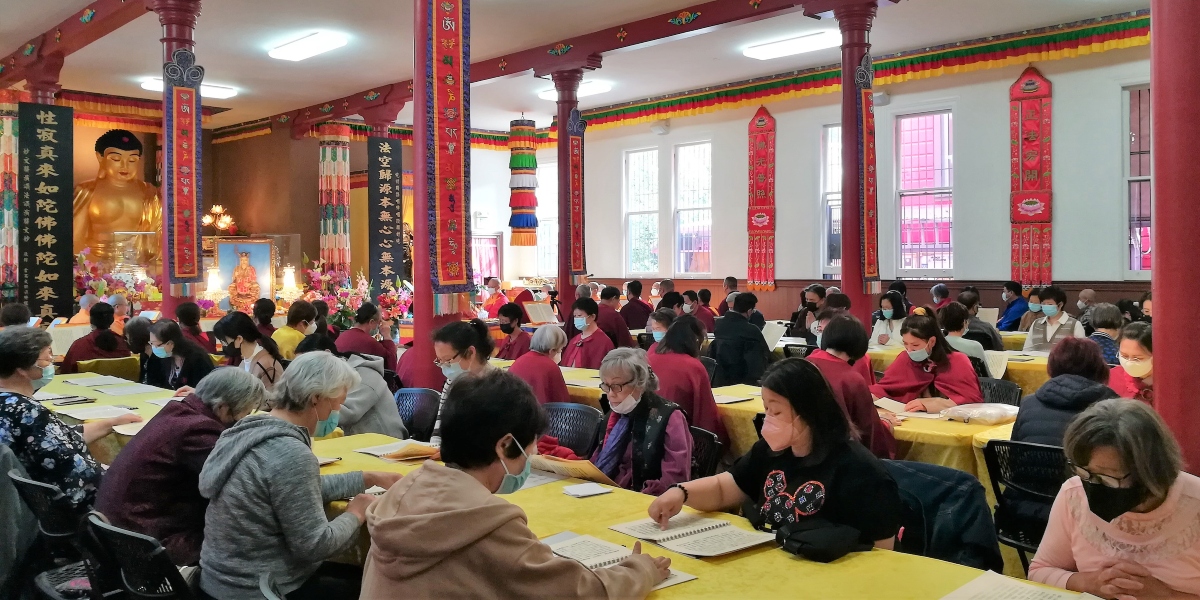Written by Melissa Jones | September 22, 2023
The World Buddhism Association Headquarters, Hua Zang Si, and the Sanger Mission jointly organized a Dharma Assembly to honor Kṣitigarbha Bodhisattva’s holy birthday and celebrate Ullambana Festival.San Francisco’s Hua Zang Si (Temple) hosted a solemn Dharma Assembly on September 10th, 2023, dedicated to paying deep respects to Kṣitigarbha Bodhisattva on the occasion of His holy birthday and also celebrating the Ullambana Festival. Under the guidance of Abbess Ruzun Ruohui, the congregation recited the Original Vows of Kṣitigarbha Bodhisattva Sutra to honor this special day. Attendees offered their heartfelt reverence to the Buddhas and prayed for blessings upon all sentient beings from the Buddhas and Bodhisattvas.
The Ullambana Festival is observed on the fifteenth day of the seventh month in the lunar calendar and is known as the Buddha’s Joyful Day. This occasion calls forth offspring to gather and pay homage to their ancestors while settling karmic debts spanning present and past lives. Amidst the customs and rituals that color this day, misconceptions often obscure the true essence of the Ullambana Festival.
One prevailing fallacy intertwines the Ullambana Festival with the notion of a Ghost Festival. This misbelief revolves around the opening of the Gates of Kidou on the first day of the lunar seventh month, granting temporary respite to wandering spirits and ghosts in the human realm throughout the month. This notion has led to a prevalent custom of hosting elaborate banquets to placate these ethereal entities. Other customs include the prohibition against nighttime whistling, as it is believed to attract wandering ghosts.
While different customs and misconceptions continue to thrive within communities, this year’s Ullambana Festival served as an opportunity to unravel the misconceptions interwoven into this tradition.
Tracing the Origin: Mahamaudgalyayana and the Ullambana Sutra
The very origins of the Ullambana Festival are rooted in the ancient text, the Buddha Speaks the Ullambana Sutra. Driven by filial piety, Mahamaudgalyayana, a formidable disciple of Shakyamuni Buddha, sought to repay his parents for their care by guiding them beyond the cycle of suffering.
With his supernatural power, Mahamaudgalyayana saw his mother afflicted and emaciated among the hungry ghosts. Filled with compassion, he offered her food, but only to witness it transformed into inedible coals due to his mother’s karmic forces. Mahamaudgalyayana was distressed and turned to Shakyamuni Buddha to seek guidance. The Buddha told him that he alone would not be able to ease her sufferings; not only should he chant Buddha’s names with single-minded concentration free of distraction for three days, but he also should make offers to the Sangha of the ten directions and ask them to practice Dharma for the sake of liberating his mother.
Following the Buddha’s instructions, Mahamaudgalyayana presented grand offerings to the virtuous Sangha assembly. With the offerings to these Sangha and his concentrated mindful chanting sutra with all the Sangha, the dharma assembly was completed on the fifteenth day of the lunar seventh month, and the great power eventually broke hell. Through this act, Mahamaudgalyayana’s mother and countless others were liberated, and the Buddha was delighted. This pivotal event led to the christening of the fifteenth day of the seventh month as the Buddha’s Joyful Day.
Ullambana Festival: Beyond Superstition
The Ullambana Festival beckons us to channel our merits towards ancestors and late parents. Contrary to misconceptions, the Ullambana Festival’s month is not a state of spectral fears but rather a state of filial reverence and auspiciousness.
According to H.H. Dorje Chang Buddha III in Learning From Buddha, who is highly respected as the Pope of Buddhism, our minds should be purified. When encountering any living being, whether they are handicapped, deficient, sick, or healthy, they should be treated equally as family members. It is important to understand that all phenomena are governed by causality. With good causes, one receives good retributions, which yield good fruits. Good fruits will enable one to receive the true Dharma. By relying on the Dharma, one can achieve perfect good fortune and wisdom. Then one can step into the state of accomplishment, break away from the sufferings that living beings experience, cease transmigrating in the cycle of birth and death, and accomplish the perfect enlightenment of a Buddha!
In the spirit of these words, as the Ullambana Festival envelopes us, it extends an invitation to delve deeper, uncover truths, and be compassionate toward our ancestors and all living beings.



